 |
||||||||||||
|
||||||||||||
 |
||
|
 |
||||||||||||
|
||||||||||||
 |
||||||||||||||||||||||||||||||||||||
|
||||||||||||||||||||||||||||||||||||
|
Still Liberal, Still Biased
How Big Media Helped the Left and Hurt the Right in 2003
By Tim
Graham and Rich Noyes
January 2004
Section 5 of 6
|
September Spinning Iraq as Vietnam-Like Quagmire: In a televised address to the nation on September 7, President Bush asked Congress for $87 billion to continue military operations in Iraq and to begin rebuilding the country’s damaged infrastructure. Bush’s desire to spend the resources required for a successful outcome prompted a rise in the number of media mavens who sought to detect a comparison between the liberation of Iraq and the failed mission in Vietnam that cost tens of thousands of American lives in the 1960s. The Vietnam analogies did not start with Bush’s budget request, of course. CBS’s Jim Acosta, on the July 19 CBS Evening News, suggested that the President was an LBJ-style liar: “This is not the first time the U.S. has gone to war based on facts that later turned out to be questionable. Almost 40 years ago, President Johnson pointed to unconfirmed reports of attacks on American ships in the Gulf of Tonkin to convince the Congress to widen the war in Vietnam.” A couple of days before Bush spoke, Dan Rather interviewed the general running the military mission in Iraq, Ricardo Sanchez. In excerpts of the interview shown on the September 4 Evening News, Rather confronted Sanchez with the defeatist Vietnam analogy: “A woman in South Carolina is quoted today as saying, ‘We’ve got a tar baby on our hands.’ Others have used the word ‘quick sand’ and ‘quagmire’ out of the Vietnam era.” To his credit, Rather then asked the general to point out “the biggest mistake or inaccuracy that the press in general is making about the situation here?” Sanchez told Rather that the biggest problem was “the fact that the press does not focus at all on the successes of our great American soldiers and sailors, airmen and Marines that are operating here in this country.” After Bush’s speech, many in the media wrung their hands raw worrying about another Vietnam. On CNN’s NewsNight, Brian Cabell noted that “It’s an argument that seems likely to become louder in the months ahead: Is this truly a continuation of the war against terrorism, or is it possibly another drawn-out, inconclusive Vietnam War in the making?” On ABC’s Nightline on September 25, Ted Koppel advertised his bias when he asked retired General Anthony Zinni, a critic of the war, whether “the whole notion of the weapons of mass destruction, the connection with al-Qaeda...was [that] as phony as the Gulf of Tonkin resolution?”
ABC viewers were then treated to a series of back-to-back clips of Presidents Lyndon Johnson (in black and white) and George W. Bush, with no dates noted for either set of clips, in order to suggest eerie similarities. In fact, the clips showed only the superficiality that passes for real thinking at ABC. The three pairs of clips:
That last one is a real plum — Stephanopoulos or someone else at ABC must think it’s telling to point out that both Presidents asked for money from Congress. Didn’t Abraham Lincoln, Woodrow Wilson, FDR and Truman also ask for appropriations for military adventures that turned out to be successful? And since when do liberals like Stephanopoulos think that money equals failure? Recall, Part I: No Scrutiny of Democratic Frontrunner: When California’s recall election was certified on July 23, the first few weeks of media coverage focused on the “circus.” CBS’s Early Show invited on joke candidates like child actor Gary Coleman, and ignored more serious candidates like conservative state senator Tom McClintock. By September, national news reports focused on a few potentially electable candidates, with liberal Democratic Lieutenant Governor Cruz Bustamante in the lead. But the networks applied no scrutiny to the then-frontrunner, despite his well-known racial controversies. In 2001, Bustamante said “n-gg-r” when he said he meant to say “Negro” in the title of a black labor organization. In college, Bustamante was an active member of MEChA (the Chicano Student Movement of Aztlan), whose symbol is an eagle clutching a dynamite stick and a machete-like weapon in its claws. Their motto: “For the Race, everything. For those outside the Race, nothing.” The group believes in reclaiming the mythical land of Aztlan, or most of the southwestern United States, for the “bronze race.”
CBS’s Hattie Kauffman was the only network reporter to raise the MEChA issue, when she questioned Bustamante on the September 3 Early Show. After mentioning Schwarzenegger’s 26-year-old Oui interview, Kauffman added: “There are ghosts in Bustamante’s past as well. He was once a member of a radical group called MEChA. This was a Chicano student group that advocated a separate nation for Mexicans in the American Southwest. Did you know that when you joined?” Bustamante avoided a direct answer and would not disavow the group. Instead, all the scrutiny was applied to Schwarzenegger. On the September 9 CBS Evening News, reporter Jerry Bowen suggested why Arnold was lagging: “The poll shows he trails Democrat Bustamante among women voters by 13 points, a gender gap aggravated perhaps by his past comments on sex and women that have drawn protesters to his campaign headquarters...And now in an Esquire magazine interview Schwarzenegger gave last spring, in which he expressed interest in the governorship, he remarked how bodybuilders are often thought to be dumb because of their appearance, same for women, he suggested.” Bowen brought on Katherine Spillar of the Feminist Majority Foundation to denounce Arnold, never noting whether her group was more partisan than principled. On April 2, 1998, Spillar showed a different take when the target was Bill Clinton, telling the Washington Post there was nothing to the Paula Jones allegations: “We have said all along that we thought it was a weak case.” Network reporters also had a tendency to only label conservatives, especially Senator McClintock. On September 25, Bowen described a TV debate: “The other three candidates —conservative Republican Tom McClintock, the Green Party’s Peter Camejo and Democratic Lieutenant Governor Cruz Bustamante — were subdued by comparison.” This labeling imbalance was strange, since the views of Bustamante and Camejo on many matters was the polar opposite of McClintock’s positions. Two days earlier on ABC’s World News Tonight, reporter Linda Douglass noted: “Schwarzenegger is also battling another Republican, conservative state senator Tom McClintock. If Davis is recalled and they split the vote, Democrat Cruz Bustamante could win.” But the liberal policies that actually overturned Gray Davis were rarely a focus of national network scrutiny. ABC, CBS, and NBC never did a morning or evening news story on the tripling of the car tax. On ABC, reporter Jake Tapper made a passing reference to how Tom McClintock “protested the recent tripling of the state car tax.” CBS was silent on the issue until October 1, when reporter Jerry Bowen noticed “the struggling governor is a victim of self-inflicted wounds. Signing a bill to give driver's licenses to illegal immigrants backfired. And long lines yesterday punctuated his problems. Motorists registering their cars ahead of today’s tripling of the car tax, a budget-balancing tool that’s infuriated voters.” Of the Big Three, only NBC reported one story on Gray Davis moving to give illegal aliens driver’s licenses.
October Recall, Part II: Massive Scrutiny of Republican Frontrunner: As the October 7 election date in California drew near and polls showed Gov. Gray Davis sinking and Arnold Schwarzenegger rising, something less than unexpected intervened to threaten the dynamic: the Los Angeles Times. In the last days of the 1992 election, the Times declined to investigate sexual allegations against Bill Clinton, describing them as “toxic waste.” But five days before the election, the Times published a story using two on-the-record women and four off-the-record women claiming the movie star had groped them, with some of the claims reaching back into the mid-1970s.
What Arnold didn’t know before answering is that a Nexis search couldn’t find the words “serial groper” or “serial abuser of women” in the archive of ABC News transcripts at any time during the Clinton years. That would include the occasions on which Jennings interviewed Bill Clinton. NBC’s Tom Brokaw lectured: “A lot of these women have made very specific accusations about grabbing them sexually and making lewd suggestions. You described it as playful and rowdy and the kind of mischief that you engaged in when you were a younger man. But based on their descriptions, in many states, what you did would be criminal, it would be a sexual assault of some kind.” This exchange marked a glaring and dramatic political bias, since in 1999, far from any Election Day, Brokaw refused to run a story on NBC’s Nightly News about Juanita Broaddrick. In the story’s only mention — a brief plug for the Dateline interview — Brokaw only referred vaguely to “controversial accusations.” President Clinton was never required to provide any specific answers about those allegations. On CBS, Dan Rather did not conduct a pre-election interview with Schwarzenegger, but the Evening News did pound on the story from Thursday night to Monday night. Back in 2001, Rather told FNC’s Bill O’Reilly that he didn’t want to touch the Broaddrick allegations because “when the charge has something to do with somebody’s private sex life, I would prefer not to run any of it.” On the night before the election, CBS at least highlighted the hypocrisy of feminist groups which defended Clinton on sexual allegations but attacked Schwarzenegger. As the race staggered to an end, descending Governor Davis was offered life-raft questions by the networks. On the Friday before the election, ABC’s Brian Rooney was advising Davis to get harsher with the GOP: “He denied some of it, admitted some of it and apologized. He may have admitted some things that are a criminal offense — it’s sexual assault.” When Davis suggested they wait for more proof, Rooney urged: “Back in August, Schwarzenegger’s campaign chief told the Sacramento Bee that this is not a position election, this is a character election. If they established it as a character race, why not meet them on those terms?” On Monday, October 6, NBC’s Campbell Brown gave Davis easy inquiries: “Can you state, unequivocally, that no one in your campaign, no one in the Democratic party, that you’re aware of, is behind these stories?” And: “Schwarzenegger also told Tom Brokaw, in this interview, that he would not respond to specific allegations until after the election. What do you think about that?”
It soon emerged that George Butler, the source of the quote, said Arnold had said “I don’t admire him for what he did with it.” The New York Times, which ran the same bad quote in its early Friday editions, rapidly corrected the error after talking to Butler. But Douglass let the smarmy charge linger, ignoring the error in her story for the next day’s World News Tonight. On the October 5 This Week, Douglass refused to acknowledge an error, only noting that Butler had a less anti-Arnold interpretation and not hinting at her own faulty reporting. TV Won’t Blame Big Spending for Big Deficits: When the final figures on the federal government’s 2003 overspending were released on October 20, both NBC and CBS carried reports on the $374 billion budget deficit, with NBC ominously warning that the deficit for the following year promised to be even greater. TV reporters seldom linked the huge increases in spending over the past several years with those supposedly deplorable deficits. Indeed, the broadcast networks frequently featured horror stories about the harm that would come to citizens if politicians could not spend all that they wished. “The federal budget deficit hit a record of $374 billion this fiscal year,” anchor Tom Brokaw announced as he blamed everything but the high rate of federal spending: “The tax cuts, the war on Iraq and a weak economy are the main reasons for the red ink which is expected to be even higher next year — as high as $500 billion, another record.” In October, MRC researchers studied 108 federal deficit stories plus another 64 stories on state government deficits aired between October 1, 2002 and September 30, 2003 (the federal fiscal year) on ABC’s World News Tonight, CBS Evening News and NBC Nightly News. The study found the networks usually cited President Bush’s tax and war policies as causing the federal deficit, while they largely exonerated state government policies, as TV reporters blamed the states’ budget shortfalls on the slow-growing U.S. economy. Overspending was rarely cited as a cause of either the federal or state budget gaps. Crunching the numbers, a total of 66 network stories linking the federal budget deficit to the tax cuts, followed by 45 that blamed the war on terrorism, homeland security costs or the war in Iraq. (Some stories suggested more than one cause.) Only 12 stories mentioned non-war related federal spending as a reason for the rising red ink, even though such spending has risen sharply in the past three years. Indeed, an August 2003 report by the Cato Institute’s Veronique de Rugy and Ted DeHaven, for example, unfavorably compared Bush’s budget requests with those of Ronald Reagan. The scholars found that Bush’s requests for new spending were hardly limited to the war on terrorism: “While Reagan attacked the ‘destructive pattern of runaway spending,’ as he called it in his second budget, Bush has expanded a wide array of ‘compassionate’ welfare state programs,” they wrote. “Real spending in nearly every department has increased substantially, sometimes exorbitantly, under Bush.” But while network reporters were aggressive at faulting Bush’s conservative tax-cutting policies, they rarely spotlighted his more liberal record on domestic spending. As far as the networks were concerned, deficits weren’t caused by politicians who spent too much, but by politicians who confiscated too little from taxpayers. ABC’s Peter Jennings reflected the media mentality perfectly on December 9, 2002 when he remarked of the new Treasury Secretary John Snow, “He is said to be in favor of further tax cuts, but against deficits. Doesn’t one lead to the other?” The media’s fixation on tax cuts was misplaced, according to free market experts. In a Heritage paper published in June, budget analyst Brian Riedl calculated “the 2001 recession and new government spending caused 78 percent of the declining surplus projection,” with tax cuts accounting for just 22 percent of the shortfall.
Only nine of 64 stories cited high spending as a cause of state budget woes. One of those was on January 11, when ABC’s World News Tonight reporter Judy Muller, in a story on California’s budget problems, ran a sound bite from economist Peter Navarro: “The Davis administration and the Democratic legislature spent like drunken sailors.” But in other instances, reporters gave state officials a pass by euphemistically referring to “rising costs,” as if politicians played only a passive role in the budget-busting process. Muller on June 30, for example, referred to “states hit by the double whammy of a huge increase in required health care costs and a huge revenue loss from the collapse of the high-tech economy.” Instead of exposing the state’s profligate spending, network news often featured alarming anecdotes to illustrate the horrors of budget cuts. On February 8, ABC’s Muller told viewers that “for a snapshot of the budget crisis facing almost every state, look at Oregon.” She then played a sky-is-falling soundbite from an Oregon health official: “It’s a catastrophe. It’s a catastrophe for people with chronic illness, poor and vulnerable populations, and most of all, for the frail elderly.” “And they’re not the only ones,” Muller continued. “In addition to slashing health care and welfare, Oregon is drastically cutting school funds.” Then, a soundbite from a student: “The education in Oregon is, you know, completely dwindling, it’s fading, it’s anexoric.” Maintaining her fearful drumbeat, Muller added: “Jails are releasing nonviolent offenders as a cost-saving measure. And the Oregon state police laid off 20 percent of their troopers.” According to Muller, the cause of those agonizing spending cuts was greedy taxpayers: “The $315 billion in budget cuts were ordered after Oregonians rejected a ballot measure calling for an income tax increase....Health officials in Oregon warn that cutting so close to the bone will soon cause very real pain.” But a February 2003 Cato Institute study by Chris Edwards, Stephen Moore and Phil Kerpen documented how state governments took in more than enough tax revenue during the 1990s. “Between fiscal years 1990 and 2001, state tax revenue grew 86 percent — more than the 55 percent of inflation plus population growth,” they calculated. “If states had limited spending growth to that benchmark, budgets would have been $93 billion smaller by FY01, representing savings roughly twice the size of today’s spending gaps.”
The Media Research Center For an interview with an MRC Spokesman, please contact Katie Wright at (703) 683-5004
Home | News Division
| Bozell Columns | CyberAlerts |
||||||||||||





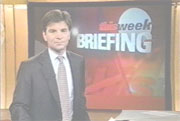 Perhaps the most ridiculous attempt to link Iraq and Vietnam came on September 14 with the debut of the newly-revamped
This Week with George Stephanopoulos, which featured a gimmicky new feature called “The Briefing.” Stephanopoulos announced: “We begin our morning briefing examining something that’s being heard more and more — that Iraq is starting to look like Vietnam.” He insisted, before George Will was allowed to undermine the premise: “There are also some striking similarities between the speeches of Lyndon Johnson and George Bush.”
Perhaps the most ridiculous attempt to link Iraq and Vietnam came on September 14 with the debut of the newly-revamped
This Week with George Stephanopoulos, which featured a gimmicky new feature called “The Briefing.” Stephanopoulos announced: “We begin our morning briefing examining something that’s being heard more and more — that Iraq is starting to look like Vietnam.” He insisted, before George Will was allowed to undermine the premise: “There are also some striking similarities between the speeches of Lyndon Johnson and George Bush.”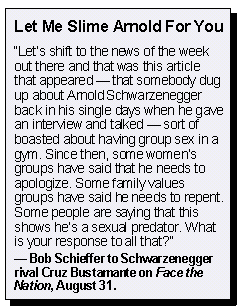 Neither ABC nor NBC mentioned Bustamante’s MEChA ties, even though both interviewed him at length. When CBS’s Bob Schieffer and
Los Angeles Times reporter Doyle McManus grilled Bustamante on the August 31
Face the Nation, they both skipped MEChA. Instead, Schieffer invited the frontrunner to pile on second-place GOP candidate Arnold Schwarzenegger for his raunchy comments in a 1977 issue of the pornographic magazine Oui. (See box.)
Neither ABC nor NBC mentioned Bustamante’s MEChA ties, even though both interviewed him at length. When CBS’s Bob Schieffer and
Los Angeles Times reporter Doyle McManus grilled Bustamante on the August 31
Face the Nation, they both skipped MEChA. Instead, Schieffer invited the frontrunner to pile on second-place GOP candidate Arnold Schwarzenegger for his raunchy comments in a 1977 issue of the pornographic magazine Oui. (See box.)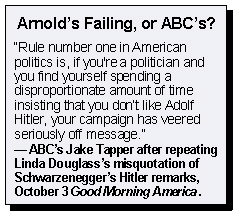 By the weekend, Arnold was granting interviews to network anchors, who are not in the habit these days of interviewing governors or gubernatorial candidates. The anchors were remarkably harsh in their questioning, especially in light of the dramatically different standard for sexual scrutiny they set for President Clinton in the last century. Peter Jennings asked: “It cannot be easy to spend the last few days of this campaign having to deal constantly with being called a serial groper or a serial abuser of women and...your admiration for Hitler. Is that tough?”
By the weekend, Arnold was granting interviews to network anchors, who are not in the habit these days of interviewing governors or gubernatorial candidates. The anchors were remarkably harsh in their questioning, especially in light of the dramatically different standard for sexual scrutiny they set for President Clinton in the last century. Peter Jennings asked: “It cannot be easy to spend the last few days of this campaign having to deal constantly with being called a serial groper or a serial abuser of women and...your admiration for Hitler. Is that tough?”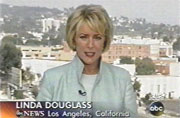 ABC’s Linda Douglass lobbed the nastiest mudball on the October 2
World News Tonight when she misquoted Schwarzenegger as saying once of Adolf Hitler, “I admire him for being such a good public speaker and for what he did with it,” even displaying the offensive quote on the screen.
ABC’s Linda Douglass lobbed the nastiest mudball on the October 2
World News Tonight when she misquoted Schwarzenegger as saying once of Adolf Hitler, “I admire him for being such a good public speaker and for what he did with it,” even displaying the offensive quote on the screen.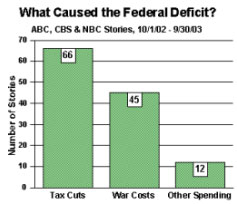 While the networks blamed Bush for the federal shortfall, state governments were victims of happenstance. Few stories about the federal deficit (just 4 out of 108) mentioned the recession as a cause, but the weak economy was the most often cited reason for state budget gaps (14 out of 64 stories, or 22 percent). “A faltering economy has left state budgets deep in the hole,” ABC’s John Berman announced on November 3, 2002. That same slowdown hurt federal receipts, too, but the networks rarely said so.
While the networks blamed Bush for the federal shortfall, state governments were victims of happenstance. Few stories about the federal deficit (just 4 out of 108) mentioned the recession as a cause, but the weak economy was the most often cited reason for state budget gaps (14 out of 64 stories, or 22 percent). “A faltering economy has left state budgets deep in the hole,” ABC’s John Berman announced on November 3, 2002. That same slowdown hurt federal receipts, too, but the networks rarely said so.